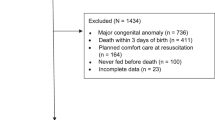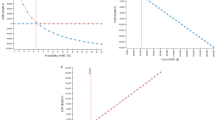Abstract
Objective
To evaluate the effect of prophylactic probiotic (PP) administration on rates of necrotizing enterocolitis (NEC), late-onset sepsis (LOS), and mortality in preterm infants.
Study design
We conducted a retrospective cohort study of infants < 29 weeks’ gestation, admitted to neonatal intensive care units participating in the Canadian Neonatal Network between 1 January 2014 and 31 December 2015. Infants in the exposure group received PP. A multiple logistic regression model with generalized estimation equation was used.
Results
A total of 3093 infants were included, 652 infants (21%) received PP. The adjusted odds ratios (aOR) of NEC (aOR 0.64, 95% confidence interval [CI] 0.410, 0.996), mortality (aOR 0.41, 95% CI 0.26, 0.63), and a composite of NEC or mortality were significantly lower in the PP group. There was no significant difference in the aOR of LOS.
Conclusion
Prophylactic probiotic administration is associated with a reduction in NEC and mortality in preterm infants.
This is a preview of subscription content, access via your institution
Access options
Subscribe to this journal
Receive 12 print issues and online access
$259.00 per year
only $21.58 per issue
Buy this article
- Purchase on Springer Link
- Instant access to full article PDF
Prices may be subject to local taxes which are calculated during checkout

Similar content being viewed by others
References
Shah PS, Eugene WY, Chan P. Members of the CNN Annual Report Committee;. The Canadian Neonatal Network Annual Report: 2015. 2015 [Accessed 6 June 2018] Available from: http://www.canadianneonatalnetwork.org/Portal/LinkClick.aspx?fileticket=9K3crPtfgQs%3d&tabid=39
Abrahamsson TR. Not all probiotic strains prevent necrotising enterocolitis in premature infants. Lancet. 2016;387:624–5.
Bisquera JA, Cooper TR, Berseth CL. Impact of necrotizing enterocolitis on length of stay and hospital charges in very low birth weight infants. Pediatrics. 2002;109:423–8.
Mihatsch WA, Braegger CP, Decsi T, Kolacek S, Lanzinger H, Mayer B, et al. Critical systematic review of the level of evidence for routine use of probiotics for reduction of mortality and prevention of necrotizing enterocolitis and sepsis in preterm infants. Clin Nutr. 2012;31:6–15.
Berrington JE, Stewart CJ, Cummings SP, Embleton ND. The neonatal bowel microbiome in health and infection. Curr Opin Infect Dis. 2014;27:236–43.
Taft DH, Ambalavanan N, Schibler KR, Yu Z, Newburg DS, Ward DV, et al. Intestinal microbiota of preterm infants differ over time and between hospitals. Microbiome. 2014;2:36.
Stewart CJ, Nelson A, Scribbins D, Marrs EC, Lanyon C, Perry JD, et al. Bacterial and fungal viability in the preterm gut: NEC and sepsis. Arch Dis Child Fetal Neonatal Ed. 2013;98:F298–303.
Good M, Sodhi CP, Ozolek JA, Buck RH, Goehring KC, Thomas DL, et al. Lactobacillus rhamnosus HN001 decreases the severity of necrotizing enterocolitis in neonatal mice and preterm piglets: evidence in mice for a role of TLR9. Am J Physiol Gastrointest Liver Physiol. 2014;306:G1021–1032.
AlFaleh K, Anabrees J. Probiotics for prevention of necrotizing enterocolitis in preterm infants. Cochrane Database Syst Rev. 2014:CD005496.
Olsen R, Greisen G, Schrøder M, Brok J. Prophylactic probiotics for preterm infants: a systematic review and meta-analysis of observational studies. Neonatology. 2016;109:105–12.
Rao SC, Athalye-Jape GK, Deshpande GC, Simmer KN, Patole SK. Probiotic supplementation and late-onset sepsis in preterm infants: A meta-analysis. Pediatrics. 2016;137:e20153684.
Costeloe K, Hardy P, Juszczak E, Wilks M, Millar MR. Probiotics in preterm infants study collaborative G. Bifidobacterium breve BBG-001 in very preterm infants: a randomised controlled phase 3 trial. Lancet. 2016;387:649–60.
Kane AF, Bhatia AD, Denning PW, Shane AL, Patel RM. Routine supplementation of Lactobacillus rhamnosus GG and risk of necrotizing enterocolitis in very low birth weight infants. J Pediatr. 2018;195:73–9.
Neu J. Routine probiotics for premature infants: let’s be careful! J Pediatr. 2011;158:672–4.
Friedhoff KT. Interaction between parasite and tick vector. Int J Parasitol. 1990;20:525–35.
Jenke A, Ruf EM, Hoppe T, Heldmann M, Wirth S. Bifidobacterium septicaemia in an extremely low-birthweight infant under probiotic therapy. Arch Dis Child Fetal Neonatal Ed. 2012;97:F217–218.
Bertelli C, Pillonel T, Torregrossa A, Prod’hom G, Fischer CJ, Greub G, et al. Bifidobacterium longum bacteremia in preterm infants receiving probiotics. Clin Infect Dis. 2015;60:924–7.
Vallabhaneni S, Walker TA, Lockhart SR, Ng D, Chiller T, Melchreit R, et al. Notes from the field: Fatal gastrointestinal mucormycosis in a premature infant associated with a contaminated dietary supplement--Connecticut, 2014. MMWR Morb Mortal Wkly Rep. 2015;64:155–6.
The Canadian Neonatal Network. Abstractor’s Manual; 2018. [Accessed 6 June 2018]; Available from: http://www.canadianneonatalnetwork.org/Portal/LinkClick.aspx?fileticket=0Va-2WLyPaU%3d&tabid=69.
Shah PS, Seidlitz W, Chan P, Yeh S, Musrap N, Lee SK, et al. Internal Audit of the Canadian Neonatal Network Data Collection System. Am J Perinatol. 2017;34:1241–9.
Bassil KL, Collier S, Mirea L, Yang J, Seshia MM, Shah PS, et al. Canadian Neonatal Network. Association between congenital anomalies and area-level deprivation among infants in neonatal intensive care units. Am J Perinatol. 2013;30:225–32.
Health Canada GoC. Licensed Natural Health ProductsDatabase (LNHPD). 6 Feb 2018 [Accessed 6 June 2018] Available from: https://health-products.canada.ca/lnhpd-bdpsnh/index-eng.jsp.
Janvier A, Malo J, Barrington KJ. Cohort study of probiotics in a North American neonatal intensive care unit. J Pediatr. 2014;164:980–5.
Li D, Rosito G, Slagle T. Probiotics for the prevention of necrotizing enterocolitis in neonates: an 8-year retrospective cohort study. J Clin Pharm Ther. 2013;38:445–9.
Denkel LA, Schwab F, Garten L, Geffers C, Gastmeier P, Piening B. Protective effect of dual-strain probiotics in preterm infants: A multi-center time series analysis. PLoS ONE. 2016;11:e0158136.
Mihatsch WA. What is the power of evidence recommending routine probiotics for necrotizing enterocolitis prevention in preterm infants? Curr Opin Clin Nutr Metab Care. 2011;14:302–6.
Deshpande GC, Rao SC, Keil AD, Patole SK. Evidence-based guidelines for use of probiotics in preterm neonates. BMC Med. 2011;9:92.
Samuels N, van de Graaf R, Been JV, de Jonge RC, Hanff LM, Wijnen RM, et al. Necrotising enterocolitis and mortality in preterm infants after introduction of probiotics: a quasi-experimental study. Sci Rep. 2016;6:31643.
Acknowledgements
We gratefully acknowledge all site investigators and abstractors of the Canadian Neonatal Network (CNN). We also thank the staff at the Maternal-Infant Care (MICare) Research Center at Mount Sinai Hospital, Toronto, ON for organizational support of CNN. In addition, we thank Xiang Y Ye, MSc for statistical support and Sarah Hutchinson, Ph.D for editorial assistance in the preparation of this manuscript. MICare is supported by a team grant from the Canadian Institutes of Health Research (CTP 87518), the Ontario Ministry of Health, and in-kind support from Mount Sinai Hospital.
Author information
Authors and Affiliations
Consortia
Corresponding author
Ethics declarations
Conflict of interest
The authors declare that they have no conflict of interest.
Additional information
Publisher’s note: Springer Nature remains neutral with regard to jurisdictional claims in published maps and institutional affiliations.
A full list of Canadian Neonatal Network Site Investigators can be found in the Supplementary Information
Supplementary information
Rights and permissions
About this article
Cite this article
Singh, B., Shah, P.S., Afifi, J. et al. Probiotics for preterm infants: A National Retrospective Cohort Study. J Perinatol 39, 533–539 (2019). https://doi.org/10.1038/s41372-019-0315-z
Received:
Revised:
Accepted:
Published:
Issue Date:
DOI: https://doi.org/10.1038/s41372-019-0315-z
This article is cited by
-
Probiotic supplementation and risk of necrotizing enterocolitis and mortality among extremely preterm infants—the Probiotics in Extreme Prematurity in Scandinavia (PEPS) trial: study protocol for a multicenter, double-blinded, placebo-controlled, and registry-based randomized controlled trial
Trials (2024)
-
Probiotic supplementation for neonates with congenital gastrointestinal surgical conditions: guidelines for future research
Pediatric Research (2023)
-
Antimicrobial utilization in very-low-birth-weight infants: association with probiotic use
Journal of Perinatology (2022)
-
Safety and efficacy of probiotic administration to preterm infants: ten common questions
Pediatric Research (2020)
-
Persistent metagenomic signatures of early-life hospitalization and antibiotic treatment in the infant gut microbiota and resistome
Nature Microbiology (2019)



